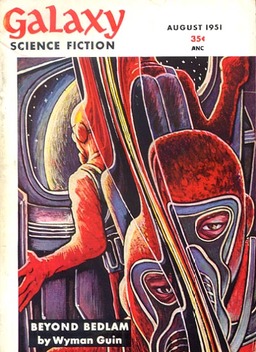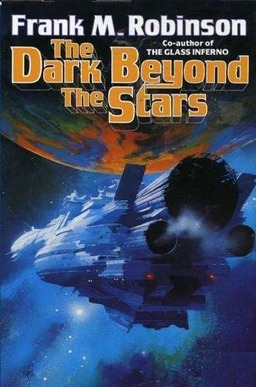Galaxy Science Fiction, August 1951: A Retro-Review
 Sometimes when I look at the table of contents for Galaxy, I can almost hear Horace Gold chuckling. In the August, 1951 issue, for example, there are stories from both Lester del Rey and Ray Bradbury. But every issue is full of talented authors, though some became more famous with the passage of time. I think it would be a struggle to compete against such a formidable magazine.
Sometimes when I look at the table of contents for Galaxy, I can almost hear Horace Gold chuckling. In the August, 1951 issue, for example, there are stories from both Lester del Rey and Ray Bradbury. But every issue is full of talented authors, though some became more famous with the passage of time. I think it would be a struggle to compete against such a formidable magazine.
“Beyond Bedlam” by Wyman Guin — Everyone in society has Multiple Personality Disorder with two strong personalities. The treatment is to allow each personality to live on its own for five days at a time, and the rules of society forbid interacting with the worlds of one’s own alternate personality. Each personality has its own name, its own job, its own spouse. Yet in the case of Bill and Conrad, who share a single body, their wives are within the same physical body. Bill’s curiosity leads him into an interaction with Conrad’s wife, and over time, it develops into an affair — something that the Medicorps would deal with severely if they found out.
Guin mistakenly uses the term schizophrenia throughout the piece, but there has been confusion between that and Multiple Personality Disorder for decades, so it’s easily ignored. This is really an amazing story — highly imaginative and suspenseful. It pulled me along quickly and I couldn’t tell where it would go; I just knew I wanted to find out. This was my favorite piece in the issue.
“Operation Distress” by Lester del Rey — During his return trip from Mars, Bill Adams notices a rash on his hands. It quickly spreads, and he’s denied clearance to land on Earth. Instead, he’s ordered to land on the moon, where a dedicated, risk-taking physician will assess his health. If Bill’s carrying a new disease, it will likely kill both men.
One curiosity beyond the story: the byline had a typo of Lester del Ray. Oops. The logistics within the story felt very realistic. It’s well-written with a nice pace. And it’s interesting that a story with such a dire plot can have a genuine, light-hearted ending.
“The Pilot and the Bushman” by Sylvia Jacobs — Jerry is a master of marketing. In fact, he knows he can cover the alien ambassador’s mistake of mentioning a Matter Repositor, a device that would essentially devalue everything because one could procure any object desired. So the ambassador strikes a deal with Jerry and the marketing man begins his campaign, struggling along on a million dollars a month retainer.
 Jerry is an intriguing character — the classic salesperson who could strike any deal and promote anything. And he’s shrewd. It’s not a bad tale.
Jerry is an intriguing character — the classic salesperson who could strike any deal and promote anything. And he’s shrewd. It’s not a bad tale.
“Pictures Don’t Lie” by Katherine MacLean — Nathen found a pattern within static from space and decoded it into video. That led to communications with an alien race. Now, the reporters and military wait at the landing site, hoping to be the first to witness the aliens’ first arrival. And they continue to wait, even after the aliens claim to have landed.
I like the concept of receiving and interpreting signals from space, and the ending was a nice touch. I did feel that there was a bit too much emphasis on building tension, to the point that I felt like I was waiting right along with the story’s characters — but not a good kind of waiting.
“The Fire and the Sword” by Frank M. Robinson — Templin and Eckert travel to Tunpesh, a planet with a primitive society. They investigate the suicide of the planet’s attaché, a man who seemed unlikely to take his own life. If the attaché didn’t commit suicide, then their task is to find out who killed him without becoming the next victims.
This is a good piece. It felt a bit like a detective story where they’re slowly unraveling the clues and trying to understand what went wrong in a perfect society. Another aspect I enjoyed was the premise of “what’s wrong with paradise” that didn’t take away from paradise itself.
“A Little Journey” by Ray Bradbury — Mrs. Bellowes, along with other wealthy citizens, waits on Mars for Mr. Thirkell to make good on his deal to take her to God. With as much as she and the others have invested, they’re all looking forward to riding a magnificent rocket into deep space.
Ah, Bradbury, such a brilliant writer, even with the shortest of tales. What more can I say? I’ve read quite a few of his stories in the past, but I don’t recall one as humorous as this. It was a bit like a dark comedy at points, but highly amusing.
Matthew Wuertz’s last retro review for us was the July issue of Galaxy Science Fiction.
So, Matt, it is hard to post an interesting response when I agree with pretty much everything you say, which is the case with this issue. Great minds think alike, I guess.
Every magazine loves to run editorials about why their magazine is so great. As I work my way through Imagination, Mr. Hamling constantly reminds his readers that it is a great magazine, an excellent one, or even the best. Despite lots of fun pulp-style stories and the occasional very good story, none of those descriptions are true of Imagination. In the case of Galaxy, however, it is good and excellent and the best of its time. The rigors an author and an editor have to go through to produce a story like “Beyond Bedlam” are easy to believe after you read the story and see how thoughtful it is. The editorial explains the process of charting and writing this story. Interesting stuff to non-writers like me.
As for the story “Beyond Bedlam” itself…this is easily one of the most complex social examinations I have ever read. Two personalities per body and a totalitarian-type system of rules is even more overwhelming than you might imagine. I may have to read this one again just to make sure I caught everything. The vision of this potential society is masterful. This is indeed a great idea with insightful storytelling. I enjoyed it.
The top of page 19 in my copy is missing the first line of each column. I wonder if all of them were printed that way…?
“Operation Distress” was a riot. SO MUCH tension built up so nicely ends in a simple but satisfying manner. I correctly picked the end of this story, but it did not take away from my enjoyment. Any space disaster story works for me 🙂
“The Pilot and the Bushman” was a little frustrating for me, but only because I have known (and still do) and work with (and still do!) people who are able to take advantage of other people’s misfortunes. It is a great story with a character that I loved to hate. One of the many ways you can divide humanity in two ways would be the self-serving opportunists and the fair-minded empaths. Sigh…why can’t we just be nice to each other?
Spell check does not like “empaths.”
“Pictures Don’t Lie” would have been a fun story at four or five pages. Instead, the author tries to build the tension over twenty pages. The same dialogue comes back over and over again and I got more and more bored with it. The ending was funny, and the story is not bad. Maybe another storyline to keep us interested would have helped.
I loved “The Fire and the Sword.” Like “Beyond Bedlam,” we have a great idea with skilled writing to bring it to life. The author does a nice job of letting the reader unravel the mystery slowly as the narrative goes on. Stories like this really helped move space opera to the next, more literate, level. This is not a simple western transposed into outer space. If anything, it is a classic clash of cultures that desperately want to work together, but ultimately…well, you know.
Religion is a touchy subject in most any venue. I think it is especially difficult in literature, particularly Science Fiction, which tends to be shunned by the most conservative church-goers. Leave it to Ray Bradbury to find a way to handle such a dangerous subject with such mastery. The people in this story are naive and being taken advantage of in a way that only a televangelist or, in this case, a space traveler could (there’s your opportunist that I mentioned above). I actually found myself cheering on the poor victims as they became, in their minds, victorious in the end.
Speaking of Ray Bradbury, I am having a terrible time finding a February 1951 Galaxy for a reasonable price. The vultures on ebay want anywhere from $100 to $150 for this issue. Yes, it is Ray Bradbury fault that that particular issue is so expensive. Once I have one I’ll have about the first eight years of Galaxy checked off. Sigh.
Thanks again Matt. Any chance you can email me when you are about to post your next review? It is stressful checking back here constantly to make sure I see the next installment before it gets buried to page two! I don’t mind posting my email here if that works best. Let me know. GG
Gus,
Yes, we seem closely aligned in our views of this issue. The top of my page 19 was missing the first lines as well, so it’s not just you. I would assume now that all are like that.
I got my copy of February, 1951 by buying the entire first year of the magazine. Try looking for “first 12 issues” or something like that. I know you’ve already got the rest, but you might find a deal by looking at a group of the first 12 or first 6, etc. rather than that single issue. “The Fireman” is a monumental story, but that’s crazy that it’s being offered at such high prices (not that it’s necessarily selling at those prices).
Yes, I could email you some warning next time. My website is http://www.matthewwuertz.com. If you go there, you should be able to find my email address. Send me a note so I’ll know how to contact you.
-Matt
Please forgive my lack of searching skills, but I am unable to find any contact info on your website. The “contact info” link is dead. Advice?
[…] Wuertz’s last retro review for us was the August issue of Galaxy Science […]